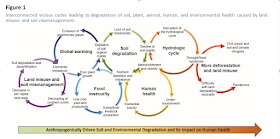Rattan Lal
Journal of Soil and Water Conservation April 2020, jswc.2020.0408A; DOI: https://doi.org/10.2489/jswc.2020.0408A
 While the continuity in science matters, extra time available can be used for initiating and strengthening scientific networks through teleconferences and virtual workshops, tabulating and synthesizing the data from prior field and laboratory studies, writing journal articles or book chapters, and reflecting and contextualizing where the soil science has been and where it should be for effectively addressing the present and emerging challenges facing humanity and the planet Earth. Specifically, the soil science community must position itself to effectively compete for the ever-dwindling research dollars necessary to document that degradation of soil quality sets in motion interconnected vicious cycles with adverse effects on environmental and human health (figure 1).
While the continuity in science matters, extra time available can be used for initiating and strengthening scientific networks through teleconferences and virtual workshops, tabulating and synthesizing the data from prior field and laboratory studies, writing journal articles or book chapters, and reflecting and contextualizing where the soil science has been and where it should be for effectively addressing the present and emerging challenges facing humanity and the planet Earth. Specifically, the soil science community must position itself to effectively compete for the ever-dwindling research dollars necessary to document that degradation of soil quality sets in motion interconnected vicious cycles with adverse effects on environmental and human health (figure 1).
Therefore, this is the time to identify the entry point(s) to effectively break the overlapping vicious cycles.
The COVID-19 crisis necessitates implementation of the “One Health “strategy: health of soil, plants, animals, people, and environment is one and indivisible.
One of the lessons learned is that we can reduce emissions voluntarily by changing our values, lifestyle, and business as usual before Mother Nature does it for us.


No comments:
Post a Comment